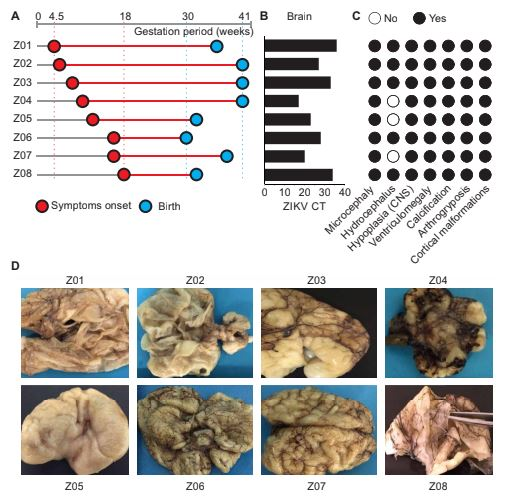Molecular alterations in the extracellular matrix in the brains of newborns with congenital Zika syndrome.
Zika virus (ZIKV) infection during pregnancy can cause a set of severe abnormalities in the fetus known as congenital Zika syndrome (CZS). Experiments with animal models and in vitro systems have substantially contributed to our understanding of the pathophysiology of ZIKV infection. Here, to investigate the molecular basis of CZS in humans, we used a systems biology approach to integrate transcriptomic, proteomic, and genomic data from the postmortem brains of neonates with CZS. We observed that collagens were greatly reduced in expression in CZS brains at both the RNA and protein levels and that neonates with CZS had several single-nucleotide polymorphisms in collagen-encoding genes that are associated with osteogenesis imperfecta and arthrogryposis. These findings were validated by immunohistochemistry and comparative analysis of collagen abundance in ZIKV-infected and uninfected samples. In addition, we showed a ZIKV-dependent increase in the expression of cell adhesion factors that are essential for neurite outgrowth and axon guidance, findings that are consistent with the neuronal migration defects observed in CZS. Together, these findings provide insights into the underlying molecular alterations in the ZIKV-infected brain and reveal host genes associated with CZS susceptibility.
Authors
Renato S Aguiar; Fabio Pohl; Guilherme L Morais; Fabio C S Nogueira; Joseane B Carvalho; Letícia Guida; Luis W P Arge; Adriana Melo; Maria E L Moreira; Daniela P Cunha; Leonardo Gomes; Elyzabeth A Portari; Erika Velasquez; Rafael D Melani; Paula Pezzuto; Fernanda L de Castro; Victor E V Geddes; Alexandra L Gerber; Girlene S Azevedo; Bruno L Schamber-Reis; Alessandro L Gonçalves; Inácio Junqueira-de-Azevedo; Milton Y Nishiyama; Paulo L Ho; Alessandra S Schanoski; Viviane Schuch; Amilcar Tanuri; Leila Chimelli; Zilton F M Vasconcelos; Gilberto B Domont; Ana T R Vasconcelos; Helder I Nakaya
External link
Publication Year
Publication Journal
Associeted Project
Systems Immunology of Human Diseases
Lista de serviços
-
As antisense RNA gets intronic.As antisense RNA gets intronic.
-
Androgen responsive intronic non-coding RNAs.Androgen responsive intronic non-coding RNAs.
-
Conserved tissue expression signatures of intronic noncoding RNAs transcribed from human and mouse loci.Conserved tissue expression signatures of intronic noncoding RNAs transcribed from human and mouse loci.
-
The intronic long noncoding RNA ANRASSF1 recruits PRC2 to the RASSF1A promoter, reducing the expression of RASSF1A and increasing cell proliferation.The intronic long noncoding RNA ANRASSF1 recruits PRC2 to the RASSF1A promoter, reducing the expression of RASSF1A and increasing cell proliferation.
-
Antisense intronic non-coding RNA levels correlate to the degree of tumor differentiation in prostate cancer.Antisense intronic non-coding RNA levels correlate to the degree of tumor differentiation in prostate cancer.
-
Insight Into the Long Noncoding RNA and mRNA Coexpression Profile in the Human Blood Transcriptome Upon Leishmania infantum Infection.Insight Into the Long Noncoding RNA and mRNA Coexpression Profile in the Human Blood Transcriptome Upon Leishmania infantum Infection.
-
Long non-coding RNAs associated with infection and vaccine-induced immunityLong non-coding RNAs associated with infection and vaccine-induced immunity
-
Comparative transcriptomic analysis of long noncoding RNAs in Leishmania-infected human macrophagesComparative transcriptomic analysis of long noncoding RNAs in Leishmania-infected human macrophages
-
SARS-CoV-2 Selectively Induces the Expression of Unproductive Splicing Isoforms of Interferon, Class I MHC, and Splicing Machinery Genes.SARS-CoV-2 Selectively Induces the Expression of Unproductive Splicing Isoforms of Interferon, Class I MHC, and Splicing Machinery Genes.

